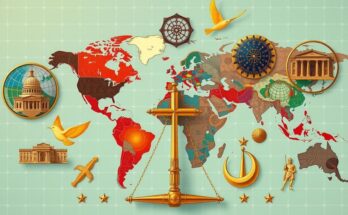President Nayib Bukele of El Salvador met with Argentina’s Vice President Victoria Villaruel to discuss Bitcoin policies and the National Digital Assets Commission. The talks highlighted El Salvador’s use of Bitcoin as legal tender and contemplated the implications of Bitcoin bonds. Interest in cryptocurrencies is gaining momentum in Argentina, coinciding with an upcoming meeting between President Javier Milei and Cardano founder Charles Hoskinson. The IMF has reiterated its cautious approach towards Bitcoin adoption, stressing the need for robust regulatory frameworks.
During an official visit to Argentina, President Nayib Bukele of El Salvador engaged in discussions with Argentina’s Vice President Victoria Villaruel regarding cryptocurrency policies, particularly focusing on Bitcoin. This meeting, conveyed through a post on social media by Villaruel, centered on the regulatory framework of Bitcoin in El Salvador and drew attention to the newly established National Digital Assets Commission, which oversees the country’s digital asset market. Victoria Villaruel expressed keen interest in El Salvador’s innovative approach, specifically the project of Bitcoin bonds initiated by Bukele’s administration to fund infrastructure and technology projects. During their dialogue, Villaruel inquired about the potential economic impact of Bitcoin on El Salvador, prompting Bukele to outline the measures implemented by his government to incorporate Bitcoin into the nation’s economy. El Salvador made history in 2021 by becoming the first country globally to accept Bitcoin as legal tender and has since implemented multiple initiatives surrounding this digital currency, including Bitcoin bonds intended for financing. The conversation spurred by Bukele and Villaruel underscores the rising excitement surrounding cryptocurrencies in Latin America, with Argentina notably displaying increased engagement in digital assets. This momentum will likely continue as President Javier Milei of Argentina is expected to convene with Cardano founder Charles Hoskinson to further explore the role of blockchain technology in enhancing the region’s cryptocurrency landscape. The International Monetary Fund (IMF) has maintained a cautious stance towards Bitcoin adoption, with spokesperson Julie Kozack urging that countries minimize public sector exposure to Bitcoin. She stated, “What we have recommended is to reduce the scope of bitcoin law, strengthen the regulatory framework and oversight of the bitcoin ecosystem.” In light of the IMF’s comments and concerns about financial risks, President Bukele has disclosed that El Salvador has accrued nearly $400 million worth of Bitcoin, indicating a commitment to integrating cryptocurrency into state finances despite international scrutiny.
The growing interest in cryptocurrencies, particularly Bitcoin, has led to significant discussions around their adoption and regulation in Latin America. El Salvador was the pioneer in recognizing Bitcoin as legal tender in September 2021, which spurred a variety of initiatives aimed at leveraging Bitcoin for economic growth. As countries like Argentina look to follow suit, discussions between their leaderships become pivotal in shaping the future of digital assets in the region. This context provides a backdrop for the meeting between President Bukele and Vice President Villaruel, marking a step toward potential regulatory advancements in Argentina, especially as it aligns with the larger trend of cryptocurrency adoption across Latin America.
The meeting between President Nayib Bukele and Vice President Victoria Villaruel serves as a crucial development in the discourse around Bitcoin and digital assets in Latin America. With El Salvador’s pioneering role and the growing interest from Argentina’s leadership, it is evident that the region is on the brink of deeper engagement with cryptocurrencies. However, caution remains necessary, as emphasized by the IMF, highlighting the need for prudent regulatory frameworks to mitigate associated risks. As discussions progress, particularly with impending dialogues involving Cardano’s founder, the future of cryptocurrency in Latin America appears poised for further exploration and potential adoption.
Original Source: www.crypto-news-flash.com




